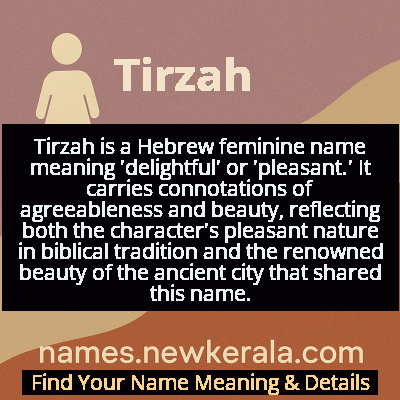Tirzah Name Meaning & Details
Origin, Popularity, Numerology Analysis & Name Meaning of Tirzah
Discover the origin, meaning, and cultural significance of the name TIRZAH. Delve into its historical roots and explore the lasting impact it has had on communities and traditions.
Name
Tirzah
Gender
Female
Origin
Hebrew
Lucky Number
1
Meaning of the Name - Tirzah
Tirzah is a Hebrew feminine name meaning 'delightful' or 'pleasant.' It carries connotations of agreeableness and beauty, reflecting both the character's pleasant nature in biblical tradition and the renowned beauty of the ancient city that shared this name.
Tirzah - Complete Numerology Analysis
Your Numerology Number
Based on Pythagorean Numerology System
Ruling Planet
Sun
Positive Nature
Leaders, ambitious, highly driven, self-reliant, innovative.
Negative Traits
Overly aggressive, domineering, impatient, selfish.
Lucky Colours
Red, orange, gold.
Lucky Days
Sunday.
Lucky Stones
Ruby, garnet.
Harmony Numbers
2, 3, 9.
Best Suited Professions
Entrepreneurs, managers, engineers.
What People Like About You
Courage, determination, leadership.
Famous People Named Tirzah
Tirzah
Biblical Figure
Successfully petitioned for women's inheritance rights in ancient Israel
Tirzah Garwood
Artist
Renowned British wood engraver and painter of the 20th century
Tirzah Raphael
Musician
Influential contemporary electronic musician with distinctive vocal style
Name Variations & International Equivalents
Click on blue names to explore their detailed meanings. Gray names with will be available soon.
Cultural & Historical Significance
Extended Personality Analysis
Individuals named Tirzah are typically associated with a naturally pleasant and agreeable disposition that lives up to the name's meaning of 'delightful.' They often possess a graceful presence that puts others at ease, combined with a strong sense of fairness and justice inherited from their biblical namesake. This combination creates personalities that are both comforting and principled—people who can advocate for important causes without sacrificing their inherent gentleness. Tirzahs tend to be diplomatic yet determined, using their natural charm to build consensus while maintaining strong moral convictions. They often excel in roles that require both interpersonal sensitivity and ethical strength, making them valued friends, mediators, and leaders. The name suggests someone who balances traditional feminine qualities with progressive values, creating a personality that is both reassuring and inspiring. Their pleasant nature is typically genuine rather than superficial, rooted in a deep-seated respect for others and commitment to doing what is right.
Modern Usage & Popularity
In contemporary naming practices, Tirzah maintains a distinctive presence as an uncommon but meaningful choice, particularly favored within Jewish communities and among parents seeking biblical names with strong feminine significance. While it has never reached mainstream popularity in most English-speaking countries, the name has experienced modest growth as part of the broader trend toward unique biblical names and names with historical depth. Modern usage often reflects appreciation for both the name's beautiful phonetic qualities and its association with female empowerment through the biblical narrative of Zelophehad's daughters. The name appeals to parents looking for options that are simultaneously traditional and distinctive, feminine yet strong, and deeply rooted in cultural heritage while remaining fresh and uncommon. Its rarity adds to its appeal for those seeking names that stand out without being invented or trendy, and its biblical origins provide a sense of timelessness and substance that many modern parents value.
Symbolic & Spiritual Meanings
Symbolically, Tirzah represents the elegant integration of beauty and justice, pleasure and principle. The name carries deep connotations of natural grace harmonized with moral courage, embodying the idea that true delight arises from integrity and fairness rather than superficial appearance alone. This symbolic richness derives from its dual biblical heritage—referencing both a city celebrated for its beauty and a woman who championed inheritance rights. Tirzah symbolizes the power of gentle persuasion and the importance of advocating for justice, even when doing so requires challenging established conventions. It represents the concept that the most genuinely pleasant qualities in a person or place include strength of character and commitment to equity. The name serves as a metaphor for how aesthetic appeal and ethical substance can coexist and enhance each other, creating a symbolic ideal of balanced excellence that combines external grace with internal conviction.

